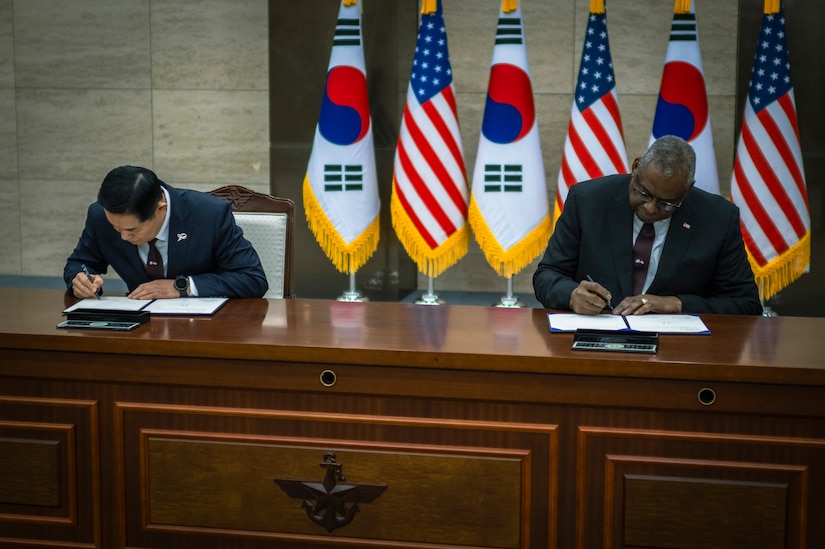Secretary of Defense Lloyd J. Austin III underscored the United States’ unwavering commitment to maintaining peace and security on the Korean Peninsula during talks today with South Korean Defense Minister Shin Won-sik in Seoul, South Korea.
The two leaders met alongside their respective delegations at the South Korean Ministry of National Defense headquarters as part of the 55th Security Consultative Meeting, an annual capstone event marking the long-standing U.S.-South Korean defense relationship.
“We have been tested time and again, and we have met every challenge,” Austin said. “Together, we’ve built one of the most robust, capable and interoperable alliances on earth. We have deterred greater conflict on the Korean Peninsula for seven decades. If necessary, we remain ready to fight tonight.”
“Our extended deterrence commitment to [South Korea] remains ironclad,” he said.
This year’s meeting comes on the heels of a commitment by President Joe Biden and South Korean President Yoon Suk Yeol to further bolstering the U.S.-South Korean alliance amid growing nuclear threats posed by North Korea.
The Washington Declaration, unveiled during Yoon’s official visit to Washington in April, outlines the two countries’ commitment to engage in deeper dialogue and information sharing to strengthen nuclear deterrence efforts on the peninsula.
The document announced the establishment of a nuclear consultative group and further underscores the United States’ commitment to extended deterrence backed by the full range of U.S. capabilities, including nuclear capabilities.
The U.S. also pledged, as part of the declaration, to enhance regular visibility of strategic assets on the Korean Peninsula.
Austin noted during today’s talks that, in the months following the declaration, a U.S. ballistic missile submarine conducted a port visit in South Korea for the first time in 40 years. The USS Ronald Reagan Carrier Strike also recently completed a port visit, and, last month, the U.S. landed a B-52 Stratofortress bomber on the Korean Peninsula for the first time this century.
“We will continue to do the things we promised to do,” Austin said in a news conference following the daylong talks. “In the past 12 months, we’ve transformed our posture in the region. We are more forward deployed and more capable to respond to anything that could happen.”
The defense ministers built upon the priorities outlined in the Washington Declaration during their meeting, as they endorsed an update to the 2013 Tailored Defense Strategy.
The updated document reflects the current security environment, North Korea’s advancing capabilities, and guidance from the most recent U.S. and South Korean national defense strategies.
During today’s session, the leaders also codified their vision for the future of the alliance. In a joint vision statement, they recognized the alliance as a “staple for peace and stability on the Korean Peninsula and in the Indo-Pacific region and a stalwart protector of international norms.”
“In recognition of the changing security environment, the alliance must adopt a forward-looking posture that is responsive to its foundational and most pressing threat— [North Korea]—while also contributing to the security of the region and the world,” according to the statement.
Austin and Shin outlined three key priorities driving the future of the alliance. Those include: deterring strategic attacks from hostile actors in the region, modernizing each nation’s capabilities to strengthen the combined defense architecture of the alliance, and strengthening solidarity and defense cooperation with like-minded partners in the region.
“Our vision is that of a peaceful Korean Peninsula and a free and open Indo-Pacific region in which the United States and [South Korea] stand together at the forefront of tackling the most significant and consequential security challenges,” the document reads.
The defense leaders lauded the strength of the longstanding U.S.-South Korea alliance following the talks and committed to further strengthening the two countries’ defense ties.
“For the past 70 years, the [South Korea]-U.S. alliance has developed into the linchpin of peace, stability and prosperity of not only the Korean Peninsula, but the world—and one of the strongest alliances in history,” Shin said.








